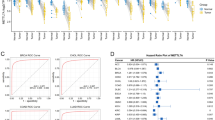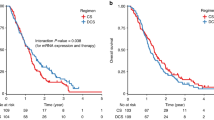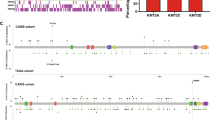Abstract
To validate established cutoff levels of thymidylate synthase (TS) and excision repair cross-complementing (ERCC-1) intratumoral mRNA expressions in tumor samples from metastatic colorectal cancer (mCRC) patients treated with PTK787/ZK222584 (PTK/ZK). From 122 samples of patients with mCRC enrolled in CONFIRM-1 (Colorectal Oral Novel Therapy for the Inhibition of Angiogenesis and Retarding of Metastases) or CONFIRM-2, mRNA was isolated of microdissected formalin-fixed paraffin-embedded samples and quantitated using TaqMan-based technology. Existing TS and ERCC-1 cutoff levels were tested for their prognostic value in first-line and second-line therapy. TS expression was associated with overall survival (OS) in first-line, but not second-line therapy. ERCC-1 was associated with OS in patients treated with first-line and second-line FOLFOX4. In first-line FOLFOX4, combination of high TS and/or high ERCC-1 was associated with shorter OS. A correlation was observed between ERCC-1 expression and benefit from PTK/ZK+FOLFOX4 treatment. TS and ERCC-1 expression is associated with clinical outcome in mCRC. Baseline TS and ERCC-1 levels may allow the selection of patients who benefit from FOLFOX4 chemotherapy.
This is a preview of subscription content, access via your institution
Access options
Subscribe to this journal
Receive 6 print issues and online access
$259.00 per year
only $43.17 per issue
Buy this article
- Purchase on Springer Link
- Instant access to full article PDF
Prices may be subject to local taxes which are calculated during checkout




Similar content being viewed by others

References
Jemal A, Siegel R, Ward E, Hao Y, Xu J, Thun MJ . Cancer statistics, 2009. CA Cancer J Clin 2009; 59: 225–249.
Chang HJ, Jung KH, Kim DY, Jeong SY, Choi HS, Kim YH et al. Bax, a predictive marker for therapeutic response to preoperative chemoradiotherapy in patients with rectal carcinoma. Hum Pathol 2005; 36: 364–371.
Esposito G, Pucciarelli S, Alaggio R, Giacomelli L, Marchiori E, Iaderosa GA et al. P27kip1 expression is associated with tumor response to preoperative chemoradiotherapy in rectal cancer. Ann Surg Oncol 2001; 8: 311–318.
Giralt J, de las Heras M, Cerezo L, Eraso A, Hermosilla E, Velez D et al. The expression of epidermal growth factor receptor results in a worse prognosis for patients with rectal cancer treated with preoperative radiotherapy: a multicenter, retrospective analysis. Radiother Oncol 2005; 74: 101–108.
Lenz HJ, Danenberg KD, Leichman CG, Florentine B, Johnston PG, Groshen S et al. p53 and thymidylate synthase expression in untreated stage II colon cancer: associations with recurrence, survival, and site. Clin Cancer Res 1998; 4: 1227–1234.
McIlwrath AJ, Vasey PA, Ross GM, Brown R . Cell cycle arrests and radiosensitivity of human tumor cell lines: dependence on wild-type p53 for radiosensitivity. Cancer Res 1994; 54: 3718–3722.
Rau B, Sturm I, Lage H, Berger S, Schneider U, Hauptmann S et al. Dynamic expression profile of p21WAF1/CIP1 and Ki-67 predicts survival in rectal carcinoma treated with preoperative radiochemotherapy. J Clin Oncol 2003; 21: 3391–3401.
Salonga D, Danenberg KD, Johnson M, Metzger R, Groshen S, Tsao-Wei DD et al. Colorectal tumors responding to 5-fluorouracil have low gene expression levels of dihydropyrimidine dehydrogenase, thymidylate synthase, and thymidine phosphorylase. Clin Cancer Res 2000; 6: 1322–1327.
Saw RP, Morgan M, Koorey D, Painter D, Findlay M, Stevens G et al. p53, deleted in colorectal cancer gene, and thymidylate synthase as predictors of histopathologic response and survival in low, locally advanced rectal cancer treated with preoperative adjuvant therapy. Dis Colon Rectum 2003; 46: 192–202.
Spindler KL, Nielsen JN, Lindebjerg J, Jakobsen A . Germline polymorphisms may act as predictors of response to preoperative chemoradiation in locally advanced T3 rectal tumors. Dis Colon Rectum 2007; 50: 1363–1369.
Stoehlmacher J, Goekkurt E, Mogck U, Aust DE, Kramer M, Baretton GB et al. Thymidylate synthase genotypes and tumour regression in stage II/III rectal cancer patients after neoadjuvant fluorouracil-based chemoradiation. Cancer Lett 2008; 272: 221–225.
Di Nicolantonio F, Martini M, Molinari F, Sartore-Bianchi A, Arena S, Saletti P et al. Wild-type BRAF is required for response to panitumumab or cetuximab in metastatic colorectal cancer. J Clin Oncol 2008; 26: 5705–5712.
Richman SD, Seymour MT, Chambers P, Elliott F, Daly CL, Meade AM et al. KRAS and BRAF mutations in advanced colorectal cancer are associated with poor prognosis but do not preclude benefit from oxaliplatin or irinotecan: results from the MRC FOCUS trial. J Clin Oncol 2009; 27: 5931–5937.
Hoeijmakers JH . Nucleotide excision repair. II: From yeast to mammals. Trends Genet 1993; 9: 211–217.
Van Houten B . Nucleotide excision repair in Escherichia coli. Microbiol Rev 1990; 54: 18–51.
Shirota Y, Stoehlmacher J, Brabender J, Xiong YP, Uetake H, Danenberg KD et al. ERCC1 and thymidylate synthase mRNA levels predict survival for colorectal cancer patients receiving combination oxaliplatin and fluorouracil chemotherapy. J Clin Oncol 2001; 19: 4298–4304.
Metzger R, Leichman CG, Danenberg KD, Danenberg PV, Lenz HJ, Hayashi K et al. ERCC1 mRNA levels complement thymidylate synthase mRNA levels in predicting response and survival for gastric cancer patients receiving combination cisplatin and fluorouracil chemotherapy. J Clin Oncol 1998; 16: 309–316.
Han SW, Oh DY, Im SA, Park SR, Lee KW, Song HS et al. Phase II study and biomarker analysis of cetuximab combined with modified FOLFOX6 in advanced gastric cancer. Br J Cancer 2009; 100: 298–304.
Vallbohmer D, Iqbal S, Yang DY, Rhodes KE, Zhang W, Gordon M et al. Molecular determinants of irinotecan efficacy. Int J Cancer 2006; 119: 2435–2442.
Johnston PG, Lenz HJ, Leichman CG, Danenberg KD, Allegra CJ, Danenberg PV et al. Thymidylate synthase gene and protein expression correlate and are associated with response to 5-fluorouracil in human colorectal and gastric tumors. Cancer Res 1995; 55: 1407–1412.
Leichman L, Lenz HJ, Leichman CG, Groshen S, Danenberg K, Baranda J et al. Quantitation of intratumoral thymidylate synthase expression predicts for resistance to protracted infusion of 5-fluorouracil and weekly leucovorin in disseminated colorectal cancers: preliminary report from an ongoing trial. Eur J Cancer 1995; 31A: 1306–1310.
Etienne MC, Chazal M, Laurent-Puig P, Magne N, Rosty C, Formento JL et al. Prognostic value of tumoral thymidylate synthase and p53 in metastatic colorectal cancer patients receiving fluorouracil-based chemotherapy: phenotypic and genotypic analyses. J Clin Oncol 2002; 20: 2832–2843.
Iacopetta B, Grieu F, Joseph D, Elsaleh H . A polymorphism in the enhancer region of the thymidylate synthase promoter influences the survival of colorectal cancer patients treated with 5-fluorouracil. Br J Cancer 2001; 85: 827–830.
Popat S, Matakidou A, Houlston RS . Thymidylate synthase expression and prognosis in colorectal cancer: a systematic review and meta-analysis. J Clin Oncol 2004; 22: 529–536.
Leichman CG, Lenz HJ, Leichman L, Danenberg K, Baranda J, Groshen S et al. Quantitation of intratumoral thymidylate synthase expression predicts for disseminated colorectal cancer response and resistance to protracted-infusion fluorouracil and weekly leucovorin. J Clin Oncol 1997; 15: 3223–3229.
Hecht J, Trarbach T, Jaeger E, Hainsworth J, Wolff R, Lloyd K . A randomized, double blind, placebo-controlled, phase III study in patients (Pts) with metastatic adenocarcinoma of the colon or rectum receiving first-line chemotherapy with oxaliplatin/5-fluorouracil/leucovirin and PTK787/ZK222584 or placebo (CONFIRM-1). Am J Clin Oncol 2005; 23 (Suppl) (abstract LBA3).
Wood JM, Bold G, Buchdunger E, Cozens R, Ferrari S, Frei J et al. PTK787/ZK 222584, a novel and potent inhibitor of vascular endothelial growth factor receptor tyrosine kinases, impairs vascular endothelial growth factor-induced responses and tumor growth after oral administration. Cancer Res 2000; 60: 2178–2189.
Koehne C, Bajetta E, Lin E, Van Cutsem E, Hecht J, Douillard J et al. Results of an interim analysis of a multinational randomized, double-blind, phase III study in patients (pts) with previously treated metastatic colorectal cancer (mCRC) receiving FOLFOX4 and PTK787/ZK 222584 (PTK/ZK) or placebo (CONFIRM 2)). Am J Clin Oncol 2006 ASCO Annual Meeting Proceedings, Part I, Vol 24, No. 18S (June 20 Supplement), 2006, p 3508.
Azuma M, Shi M, Danenberg KD, Gardner H, Barrett C, Jacques CJ et al. Serum lactate dehydrogenase levels and glycolysis significantly correlate with tumor VEGFA and VEGFR expression in metastatic CRC patients. Pharmacogenomics 2007; 8: 1705–1713.
Bonner RF, Emmert-Buck M, Cole K, Pohida T, Chuaqui R, Goldstein S et al. Laser capture microdissection: molecular analysis of tissue. Science 1997; 278: 1481–1483.
Chomczynski P, Sacchi N . Single-step method of RNA isolation by acid guanidinium thiocyanate–phenol–chloroform extraction. Anal Biochem 1987; 162: 156–159.
Lord RV, Salonga D, Danenberg KD, Peters JH, DeMeester TR, Park JM et al. Telomerase reverse transcriptase expression is increased early in the Barrett's metaplasia, dysplasia, adenocarcinoma sequence. J Gastrointest Surg 2000; 4: 135–142.
Gibson UE, Heid CA, Williams PM . A novel method for real time quantitative RT-PCR. Genome Res 1996; 6: 995–1001.
Ichikawa W, Takahashi T, Suto K, Yamashita T, Nihei Z, Shirota Y et al. Thymidylate synthase predictive power is overcome by irinotecan combination therapy with S-1 for gastric cancer. Br J Cancer 2004; 91: 1245–1250.
Kim SH, Kwon HC, Oh SY, Lee DM, Lee S, Lee JH et al. Prognostic value of ERCC1, thymidylate synthase, and glutathione S-transferase pi for 5-FU/oxaliplatin chemotherapy in advanced colorectal cancer. Am J Clin Oncol 2009; 32: 38–43.
Yang D, Zhang W, Winder T, Bohanes PO, Ning Y, Danenberg KD et al. Correlations of mRNA expression levels of genes in the targeted pathways and Kras mutation status in patients with colorectal cancer. ASCO, 14 June 2010 (abstract 10641).
El-Khoueiry AB, Pohl A, Danenberg K, Cooc J, Zhang W, Yang D et al. Wt Kras and gene expression levels of VEGFR2, EGFR, and ERCC-1 associated with progression-free survival (PFS) in patients (pts) with metastatic colorectal cancer (mCRC) treated with first-line 5-FU or capecitabine with oxaliplatin and bevacizumab (FOLFOX/BV or XELOX/BV). ASCO, 2009 (abstract 4056).
Gandara DR, Grimminger P, Mack PC, Lara Jr PN, Li T, Danenberg PV et al. Association of epidermal growth factor receptor activating mutations with low ERCC1 gene expression in non-small cell lung cancer. J Thorac Oncol 2010; 5: 1933–1938.
Tyagi P . Vatalanib (PTK787/ZK 222584) in combination with FOLFOX4 versus FOLFOX4 alone as first-line treatment for colorectal cancer: preliminary results from the CONFIRM-1 trial. Clin Colorectal Cancer 2005; 5: 24–26.
Giantonio BJ, Catalano PJ, Meropol NJ, O’Dwyer PJ, Mitchell EP, Alberts SR et al. Bevacizumab in combination with oxaliplatin, fluorouracil, and leucovorin (FOLFOX4) for previously treated metastatic colorectal cancer: results from the Eastern Cooperative Oncology Group Study E3200. J Clin Oncol 2007; 25: 1539–1544.
Hurwitz H, Fehrenbacher L, Novotny W, Cartwright T, Hainsworth J, Heim W et al. Bevacizumab plus irinotecan, fluorouracil, and leucovorin for metastatic colorectal cancer. N Engl J Med 2004; 350: 2335–2342.
Tyagi P, Grothey A . Commentary on a phase III trial of bevacizumab plus XELOX or FOLFOX4 for first-line treatment of metastatic colorectal cancer: the NO16966 trial. Clin Colorectal Cancer 2006; 6: 261–264.
Cunningham D, Wong RP, D’haens G, Douillard J, Robertson J, Saunders O et al. A phase II, double-blind, randomized multicenter study of cediranib with FOLFOX versus bevacizumab with FOLFOX in patients with previously treated metastatic colorectal cancer (mCRC): Final PFS results. ASCO Annual Meeting, 2008 (abstract 4028).
Uchida K, Danenberg PV, Danenberg KD, Grem JL . Thymidylate synthase, dihydropyrimidine dehydrogenase, ERCC1, and thymidine phosphorylase gene expression in primary and metastatic gastrointestinal adenocarcinoma tissue in patients treated on a phase I trial of oxaliplatin and capecitabine. BMC Cancer 2008; 8: 386.
Acknowledgements
This work was sponsored by Novartis and Bayer Schering Pharma as part of a co-development program. The P30CA number is from Kathy Pfeiffer, Dhont Family Foundation. Editorial assistance was provided by Scientific Connexions (Newtown, PA, USA).
Author information
Authors and Affiliations
Corresponding author
Ethics declarations
Competing interests
The authors declare no conflict of interest.
Additional information
Previous Presentation: Parts of these results were presented at the ASCO 2008 Annual Meeting in the poster presentation (abstract 4131) and at the ASCO 2010 Annual Meeting (abstract 48363).
Supplementary Information accompanies the paper on the The Pharmacogenomics Journal website
Supplementary information
Rights and permissions
About this article
Cite this article
Grimminger, P., Shi, M., Barrett, C. et al. TS and ERCC-1 mRNA expressions and clinical outcome in patients with metastatic colon cancer in CONFIRM-1 and -2 clinical trials. Pharmacogenomics J 12, 404–411 (2012). https://doi.org/10.1038/tpj.2011.29
Received:
Revised:
Accepted:
Published:
Issue Date:
DOI: https://doi.org/10.1038/tpj.2011.29
Keywords
This article is cited by
-
Targeted multiplex proteomics for molecular prescreening and biomarker discovery in metastatic colorectal cancer
Scientific Reports (2019)
-
Colorectal Cancer: Why Does Side Matter?
Drugs (2018)
-
AGXT and ERCC2 polymorphisms are associated with clinical outcome in metastatic colorectal cancer patients treated with 5-FU/oxaliplatin
The Pharmacogenomics Journal (2016)
-
Standing the test of time: targeting thymidylate biosynthesis in cancer therapy
Nature Reviews Clinical Oncology (2014)
-
Correlation between expression of thymidylate synthase and clinical outcome of advanced gastric cancer treated with capecitabine alone chemotherapy
Tumor Biology (2014)


